We need the 'trees'.
... They were Ranginui, the Sky
Father, and Papatuanuku, the Earth Mother, both sealed
together in a close embrace. Crushed between the weight of their
bodies were their many children, whose oppression deepened. They
yearned to be free; they fought their parents and each other to
break loose. Tuumatauenga, virile god of war, thrust and
shouted; Tangaroa of the oceans whirled and surged;
Tawhirirangimaatea, Haumiatiketike and Rongomatane,
of wild foods and cultivated crops, tried their best but were
not successful; and Ruamoko, god of earthquakes, yet to
be born, struggled in the confinement of his mother's womb ...
Of them all, Taane Mahuta [cfr Mahute, Boussonetia
papyrifera], the god of the forests, was
the most determined; he set his sturdy feet upon his father's
chest, and braced his upper back and shoulders against the bosom
of his mother. He pushed; and they parted. So the world, as the
Maori understand it, came into being ...
|
he |
hauhau. |
Hau = Thread,
line, string, ribbon; this is the name
of the fibres of the hauhau tree
formerly used to make twine, cloth,
etc.; hau kahi, fishing line for
tuna; hau here, line for eel
trap; hau moroki, strong, tough
line, thread; hau paka, fibres of
the hauhau tree, which were first
soaked in water, then dried to produce a
strong thread. Ha'u = Hat.
Vanaga. Hat, cord; the tree
Triumfetta semitriloba. Van Tilburg.
Ta.: The tree Hibiscus tiliaceus.
Henry. Hau. 1 a. Hibiscus. b.
Wick. P Pau.: fau, hibiscus.
Mgv.: hau, id. Mq.: fau,
hau, id. Ta.: fau, id. 2.
To contribute. Ta.: aufau, to
pay, to contribute, to subscribe. 3.
Hat, cap, helmet; hakarere ki te hau,
to take off the hat. Ta.: fauurumaa,
war bonnet. 4. Dew; hakaritorito ki
te hau, to bleach in the dew. P
Mgv., Mq.,Ta.: hau, dew. 5. To
blow freshly, coolness, zephyr,
salubrious, breeze, wind (hahau,
ahau); kona hauhau,
kona hahau, a breezy spot; ahau
ora, agreeable breeze; hakahahau,
to hang out in the air; hakaahau,
to blow. T Mgv.: hau, to blow,
blusterous, to breathe. Haua,
hoarse. (Hauha); araha hauha,
to wait for, to look forward to.
Hauhau, 1. dog (onomatopoetic). 2 a.
To scratch, to scrape, to rub. b. Wood
used in plowing fire. 3. (hau 5).
Haumaru (hau 5 -
marumaru) cool, cold. Hauù,
to replace. Hauva, twin, cut T.
Hauvaero (hau 3 - vaero)
plume, aigrette, head ornament.
Hauvarikapau (hau 3 -
varikapau) plume, aigrette, head
ornament. Churchill. Pau.: Hau,
superior, kingdom, to rule. Mgv.: hau,
respect. Ta.: hau, government.
Mq.: hau, id. Sa.: sauā,
despotic. Ma.: hau,
superior. Hauhau,
to attack. Ma.: hau,
to chop. Churchill.
Sa.:
fau,
to tie together, to fasten by tying, the
tree (Hibiscus tiliaceus)
whose bast is used for cord, the kava
strainer made therefrom, strings in
various uses; fafau,
to lash on, to fasten with sennit;
faufau,
to fasten on, to tie together. To.:
fau,
to fasten up the hair, the name of the
hibiscus, the kava strainer made
therefrom; faufau,
to fasten the outriggers of small
canoes; hau,
to fasten to; fehauaki,
to tie. Fu.: fau,
the hibiscus, the kava strainer;
faù,
fafaù,
faùfaù,
to attach, to tie. Niuē: fau,
fafau,
to make by tying. Fotuna:
no-fausia,
to tie, to fasten. Ta.: fau,
the hibiscus; fafau,
to tie together. Pau.: fau,
the hibiscus. Nuguria: hau,
id. Ma.: hau,
to bind, to fasten together;
whau, a
shrub; whauwhau,
to tie. Ha.: hau,
name of a tree with a practicable bark.
Mq.: hau,
the hibiscus. Mgv.: hau,
id.; hahau,
to join or tie with cords. Nukuoro:
hau,
the hibiscus, a garland. Mg.:
au, the
hibiscus. Vi.: vau,
the hibiscus; vautha,
to bind together. Churchill 2. |
|
mahute. |
Mahute. A tree (Boussonetia
papyrifera) formerly more abundant
on the island, the fibres of which were
used for clothing (see nua and
hami). Vanaga. The tree
Broussonetia papyrifera,
indispensible for all types of fasteners
(lines, twine, ropes, and rigging).
Barthel 2. Maute, paper mulberry
(mahute G). P Mgv.: eute,
ute, id. Mq.: ute, id.
Ta.: aute, Hibiscus
rosa-sinensis. Pau.: aute,
id. Mahutehute (mahute -
tutu 1) bast cloth in the last
stage of preparation (maute).
Churchill.
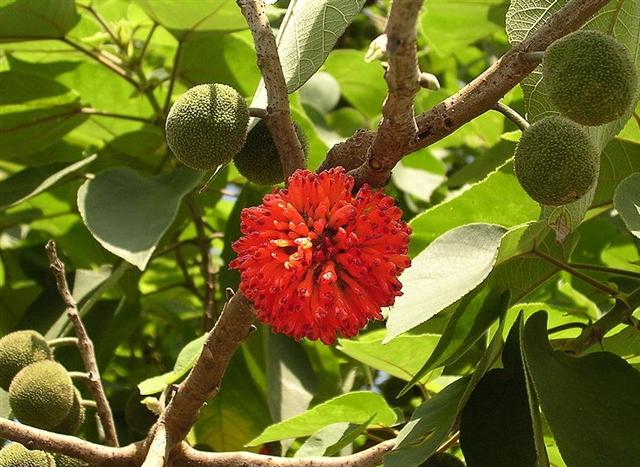 |
|
a Oti: |
|
ngaatu |
Gaatu, totora
reed. Vanaga.
Gaatu 1. Bulrush, reed. 2.
(gatu). Churchill.Gatu.
Gaatu, totora reed. Gatu: 1.
To press, to tighten, to squeeze. 2. To
pack tight. 3. To pull suddenly, to give
a jerk. I ka hakarogo atu, ku eke á
te kahi, he gatu mai, as soon as he
felt the tuna be, he pulled in [the
line] with a sharp jerk. 4. To kick. 5.
E gatu te hagu, to wait for
something impatiently (gatu,
breath). 6. Shortly, very soon. He
tu'u gatu, he is coming shortly, he
is just about to arrive. Vanaga.
Bulrush, reed. Gaatu (gatu)
1. To feel of, to pinch, to throttle
with the hands, to touch, to press (gaatu);
gatuga, pressure; gatugatu,
to trample down. T Mgv.: natu, to
press out linen, to squeeze a person or
a sore place. Mq.: natu, to
pinch. Ta.: natu, to pinch, to
bruise. 2. To suppurate. 3. Gatu mai
gatu atu, sodomy. Gatua (gatu
1), tractable, to press.
Churchill.
Scirpus riparius var. paschalis.
Barthel 2.
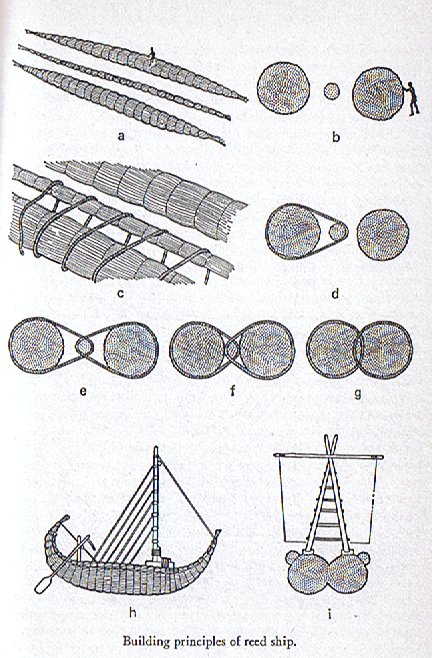 |
|
tavari |
Tavari,
the plant
Polygonum acuminatum grows
on the crater lakes in close association
with rushes and seems to have been used
for medicinal purposes. Barthel 2.
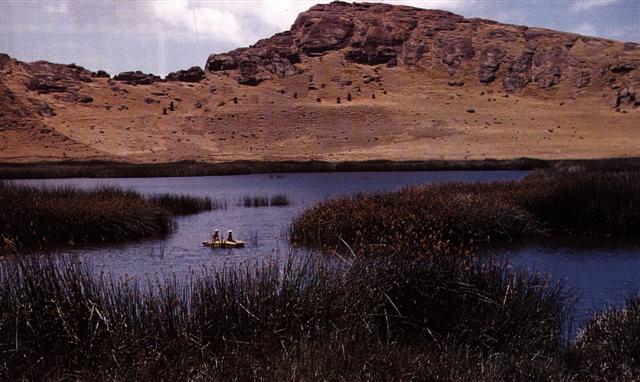 |
|
riku |
Riku.
To grow in abundance;
he-riku te rokia, the grass grows
thickly. Vanaga. A light green fern,
whose roots were eaten in times of
famine. Barthel 2. Vine (fern) T.
Churchill. |
|
ngaoho |
Gaoho. A shrub (Caesalpinia).
Vanaga. Caesalpinia bonduc. The
fibres were used as fasteners and the
fruit as ornaments, and the plant also
seems to have been used for medicinal
purposes. Barthel 2. |
|
naunau. |
Nau.
Sandalwood which used to grow on the
steep slopes of the coast: nau opata.
Vanaga. The Sandalwood (Santalum)
tree. During the birdman ceremonies at
Orongo, a piece of sandalwood was
tied to the arm with which the
victorious birdman held up the egg of
the sooty tern. Barthel 2.
... He [Oroi]
went into a (grove of ) sandalwood. He
had hidden there so he could watch the
arrival of the king and (at the moment
when) the foot (of the king touched the
loop) quickly pull the rope. Then
Oroi would come out immediately and
kill the king ... Barthel 2. |
|
uku koko |
Ukukoku,
A plant. Vanaga.
Uku koku
is the name of a dark type of grass,
which in earlier times was used to make
hats. Barthel 2.
 |
|
nehenehe
* 2 |
Nahe.
Ta.: Angiopteris erecta
[maybe evecta?: 'Mule's-foot
Fern']. Sa.: nase, the giant
fern. Churchill. Bishop Jaussen:
crustacé. Barthel. In Jamaica the
species Angiopteris evecta
['Mule's-foot Fern'] is widely
naturalized and is registered as an
invasive species. The plant was
introduced by Captain Bligh from Tahiti
as a staple food for slaves and
cultivated in the Castleton Gardens in
1860. From there it was able to
distribute itself throughout the eastern
half of the island. Wikipedia.
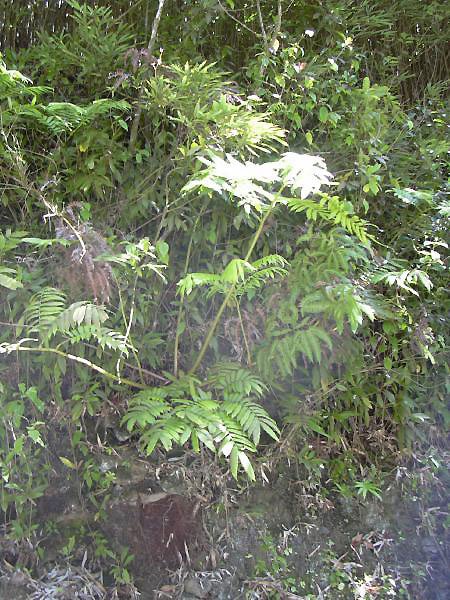
... I
remember from somewhere in Heyerdahl's
books that he considered it significant
that neke-neke was a special word
in the vocabulary of Easter Island, it
meant 'walking without legs, walking by
moving the weight this side and that
slowly advancing forward'. He had
discovered the word when he asked how
the statues had been moved - they walked
(neke-neke) was the answer
... |
|
poporo. |
Poporo.
A plant (Solanum forsteri);
poporo haha, a sort of golden
thistle. Vanaga. A berry whose juice is
mixed with ashes of ti leaves in
tattoing. Ta.: oporo, a capsicum
plant. The Tahiti oporo is not a
degradation of poporo but is the
original poro stem augmented by
that o which in Tahiti is
word-formative in a sense too elusive to
find expression in European ideas. Mgv.:
poporo, the July season when the
leaves fall. Mq.: pororo, dry,
arid. Sa.: palolo-mua, July. Ma.:
paroro, cloudy weather.
Poporohiva, milk thistle. Churchill |
|
kavakava atua |
Kava. 1. Sour;
salty: vai kava, saltwater, sea;
te kava o te haíga, acrid
underarm smell; tagata kava - tagata
kakara i te kava, man with smelly
armpits. 2. He-kava te haha, to
be thirsty. 3. To turn sour, to become
embittered, bad-tempered, exasperated
(used with manava): tagata
manava kava, bad-tempered, angry
man. Vanaga. Bitter, salt; vai kava,
brackish water; hakakava, to
embalm; kavakava, acid, sharp,
bitter, salt, spiritous, vinegar,
poisonous, disagreeable; akavakava,
to make sharp; hakakavakava, to
make acid. P Pau.: kava,
disagreeable to the taste; kavakava,
acid, sharp. Mgv.: kava, to be
bitter, sour, acid, salt. Mq.: kava,
bitter. Ta.: ava, bitter, acid,
salt. Kavahia: 1. Comfort,
comfortable, to feast; hakakavahia,
comfort, comfortable. 2. Repulsive (of
food), disgusted; hakakavahia,
repulsion. Kavakava, rib; moi
kavakava, a house god G. P Mgv.:
vakavaka, the breast. Mq.:
vakavaka, vaávaá, rib. Ma.:
wakawaka, parallel ridges. We
shall need all the available material in
order to determine the germ sense of
this word. Sa.: va'ava'a, the
breast-bone of a bird; fa'ava'a,
the frame as of a slate. To.:
vakavaka, the side. Fu.: vakavaka,
the side below the armpit. Ha.:
hoowaa, to make furrows. In all
these we may see the idea of ridge or
depression, or of both, as primal
(Rapanui, Samoa, Marquesas, Maori,
Hawaii), and as secondary the part of
the body where such appearances is
common (Mangareva, Tonga, Futuna).
Churchill. Mgv.: kava, the pepper
plant and the drink made therefrom. Ta.:
ava, id. Mq.: kava, id.
Sa.: 'ava, id. Ma.: kawa,
a pepper. Kavakava, a fish. Sa.:
'ava'ava, id. Kavapui, a
tree. Ta.: avapuhi, a fragrant
plant. Mq.: kavapui, wild ginger.
Sa.: 'avapui, id. Ha.: awapuhi,
id. Churchill. Mq.: ava, a small
fish of sweet water. Sa.. 'ava'ava,
a small fish. Ha.: awa, a fish.
Kakava, burnt. Sa.: 'a'ava,
very hot. Churchill.
.jpg) |
|
kohe. |
Kohe. A plant
(genus Filicinea) that grows on
the coast. Vanaga. Vave kai kohe,
inaccessible. Churchill. *Kofe is
the name for bamboo on most Polynesian
islands, but today on Easter Island
kohe is the name of a fern that
grows near the beach. Barthel 2.
Koe.
I tu'u mai ai a koe. Du kamst /
du bist angekommen. Bergmann.
...
he oho hokoou
te kuhane he ata pe hiva he hati te kohe
i te vae [she broke the kohe
plant with her feet]
he nape i te ingoa ko hatinga te kohe.a hau maka. o hiva ... (E:8) |
|
pua |
Pua. 1. A
zingiberacea (plant of which few
specimens are left on the island). 2.
Flower: pua ti, ti flower, pua
taro, taro flower, pua maúku
pasture flower; pua nakonako, a
plant which grows on steep slopes and
produce red, edible berries. 3. Pua
tariga (or perhaps pu'a tariga),
anciently, hoops put in earlobes. 4. The
nanue fish when young and tender.
Puapua, summit, top, upper part;
te puapua o te maúga, the top of
the mountain; te puapua kupega,
the upper part of a fishing net. Vanaga.
Pu'a. 1. (Modern form of pu'o),
to cover up something or oneself, to put
on; ka-pu'a te ha'u, put on your
hat; ka-pu'a-mai te nua, cover me
up with a blanket. 2. To respond to the
song of the first group of singers; to
sing the antistrophe; he-pu'a te tai.
3. To help; ka-pu'a toou rima ki a
Timo ite aga, help Timothy with the
work. 4. Pu'a-hare, to help a
relative in war or in any need;
ka-oho, ka-pu'a-hare korua, ko ga kope,
go, give your relative a hand, lads.
5. To speak out in someone's favour;
e pu'a-mai toou re'o kia au, speak
in my favour, intercede for me.
Pu'apu'a, to hit, to beat. Vanaga.
1. Flower, ginger, soap; pua mouku,
grass. 2. To grease, to coat with tar,
to pitch; pua ei meamea, to make
yellow. Puapua, a piece of cloth.
Mgv.: pua, a flower, turmeric,
starchy matter of the turmeric and hence
soap. Mq.: pua, a flower, soap.
Ta.: pua, id. Ma.: puapua,
cloth wrapped about the arm. Churchill. |
|
harahara |
Hara. Harahara 1.
Misaligned (of roofing, basketware,
etc.); e harahara nó te kete, the
basket is misaligned (its strips are not
parallel. 2. A sort of taro. 3. Latrine,
defecating ground. Vanaga. 1. Pandanus.
P Mgv.: ara, puhara,
pandanus (tree); hara, a bunch of
pandanus fruit, old pandanus. Mq.:
faá haá, pandanus. Ta.: fara,
id. 2. Error, mistake, oversight, wrong;
to err, to confound, to mistake;
manau hara, illusion; toua hara,
discussion without knowing the object. P
Mgv.: ara, arara,
defective, abortive, to miss, to fail, a
fault, a quarrel; hara, a fault,
a mistake, an error, a dispute, a
quarrel, undisciplined. Mq.: hara,
a rake, libertine. Ta.: hara,
sin, fault, crime. Churchill. |
|
hua taru. |
Hua. 1. Testicle.
2. Figuratively: son, hua tahi,
only son; fruits of the earth; to grow
well (of fruits). 3. To cause a fight, a
quarrel. Hua-ai, generation, as
lineage of direct descendents;
contemporaries. Huahua, coccyx of bird, 'parson's nose':
huahua moa, huahua uha.
Huataru, a creeper (Chenopodium
ambiguum). Vanaga. 1. The same;
ki hua, again, to continue, to
strain, to struggle, to move, to repeat,
over and above. Mq.: hua, the
same, to return, to recommence. 2.
To bloom, to sprout; flower, fruit (huaa);
huaa tae oko, huaa vahio,
young fruit; hua atahi, only son;
huahaga, fruit; mei te huahaga
o tokoe kopu, the fruit of thy body;
tikea huahaga, deceptive
appearance. P Pau.: ua, to be
born; huahaga, lineage. Mgv.:
hua, to produce (said of trees,
grain, etc.), blooming time of flowers,
abundance of fruit. Mq.: hua, to
produce, to bear fruit. Ta.: ua,
to sprout. Huahua. 1. Tailless
fowl. 2. Vein, tendon, line. 3. Mgv.:
huahua, pimples covering the face.
Ta.: huahua, id. Mq.: hua,
tubercules. Sa.: fuafua, abscess
on hand or feet. Ma.: huahua,
small pimples. Pau.: Hua-gakau,
rupture. Ta.: áau, entrails. Sa.:
ga'au, id. Ma.: ngakau,
id. Churchill. 1. Fruit. 2. Egg. 3. Tā
hua = 'genealogical writing' or
'same writing'. Fischer. |
|
makere
hata. |
Hata. 1. Table,
bureau. P Pau.: afata, a chest,
box. Mgv.: avata, a box, case,
trunk, coffin. Mq.: fata, hata,
a piece of wood with several branches
serving as a rack, space, to ramify, to
branch; fataá, hataá,
stage, step, shelf. Ta.: fata,
scaffold, altar. 2. Hakahata, to
disjoint; hakahatahata, to
loosen, to stretch. P Pau.: vata,
an interval, interstice. Mgv.: kohata,
the space between two boards, to be
badly joined; akakohata, to leave
a space between two bodies badly joined;
hakahata, to be large, broad,
wide, spacious, far off. Mq.:
hatahata, fatafata, having
chinks, not tightly closed, disjointed.
Ta.: fatafata, open. 3.
Hatahata, calm, loose, prolix, vast.
Mgv.: hatahara, broad, wide,
spacious, at one's ease. Ta.:
fatafata, free from care. Mq.:
hatahata, empty, open. 4.
Hatahata, tube, pipe, funnel.
Churchill. Sa.: fata, a raised
house in which to store yams, a shelf, a
handbarrow, a bier, a litter, an altar,
to carry on a litter; fatāmanu,
a scaffold. To.: fata,
a loft, a bier, a handbarrow, to carry
on a bier; fataki,
a platform. Fu.: fata,
a barrow, a loft; fatataki,
two sticks or canes attached to each
other at each side of a house post to
serve as a shelf. Niuē: fata,
a cage, a handbarrow, a shelf, a stage,
(sometimes) the upper story of a house.
Uvea: fata,
a barrow, a bier. Fotuna: fata,
a stage. Ta.: fata,
an altar, a scaffold, a piece of wood
put up to hang baskets of food on;
afata,
a chest, a box, a coop, a raft, a
scaffold. Pau.: fata,
a heap; afata,
a box, a chest. Ma.: whata,
a platform or raised storehouse for
food, an altar, to elevate, to support.
Moriori: whata,
a raft. Mq.: fata,
hata,
hataá,
shelves. Rapanui: hata,
a table. Ha.: haka,
a ladder, an artificial henroost;
alahaka,
a ladder. Mg.: ata,
a shelf; atamoa,
a ladder; atarau,
an altar. Mgv.: avata,
a coffer, a box. Vi.: vata,
a loft, a shelf; tāvata,
a bier. The Samoan fata
is a pair of light timbers pointed at
the ends and tied across the center
posts of the house, one in front, the
other behind the line of posts; rolls of
mats and bales of sennit may be laid
across these timbers; baskets or
reserved victuals may be hung on the
ends. The litter and the barrow are two
light poles with small slats lashed
across at intervals. The Marquesan
fata
is a stout stem of a sapling with the
stumps of several branches, a hat tree
in shape, though found among a barehead
folk. These illustrations are sufficient
to show what is the common element in
all these fata
identifications, light cross-pieces
spaced at intervals. With this for a
primal signifaction it is easy to see
how a ladder, a raft, a henroost, an
altar come under the same stem for
designation. Perhaps Samoan
fatafata
the breast obtains the name by reason of
the ribs; it would be convincing were it
not that the plumpness of most Samoans
leaves the ribs a matter of anatomical
inference. Churchill 2.
... Teke said to
Oti, 'Go and take the hauhau
tree, the paper mulberry tree, rushes,
tavari plants, uku koko
grass, riku ferns, ngaoho
plants, the toromiro tree,
hiki kioe plants (Cyperus vegetus),
the sandalwood tree, harahara
plants, pua nakonako plants,
nehenehe ferns, hua taru
grass, poporo plants, bottle
gourds (ipu ngutu), kohe
plants, kavakava atua ferns,
fragrant tuere heu grass,
tureme grass (Diochelachne
sciurea), matie grass, and
the two kinds of cockroaches makere
and hata.'
... The division into quarters of
a 28-series can be applied to the main
phases of the moon during the visible
period as was as to a (reflex of the old
world?) sidereal month.
The separate subgroup (29
makere - 30 hata) consists of
the names of two types of cockroaches,
but in related eastern Polynesian
languages these names can also be
explained on a different level. MAO.
makere, among others, 'to die', and
whata, among others, 'to be laid
to rest on a platform', deserve special
attention.
The theme hinted at is one of
death and burial. In our scheme they
occur at just that time when the moon
'has died'! This lends further support
to the lunar thesis.
Barthel 2.
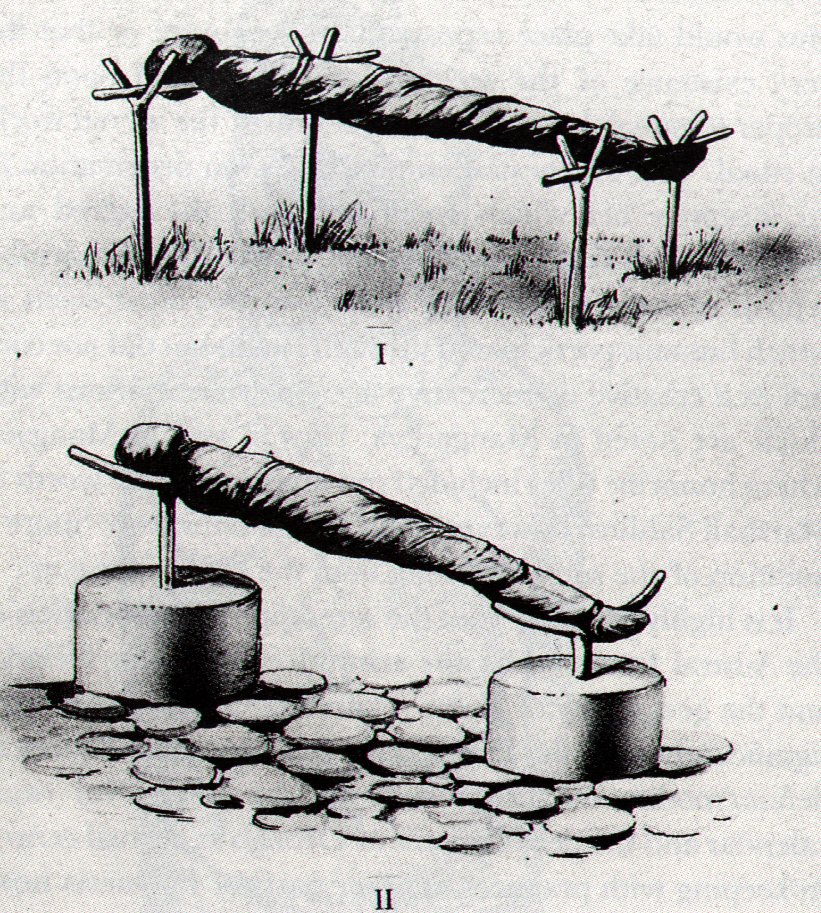 |
|
tuere heu. |
Heu.
Offspring of parents from two different
tribes, person of mixed descent,
e.g. father Miru, mother
Tupahotu. Heuheu, body
hair (except genitals and armpits).
Vanaga. 1. Heheu; ivi heheu,
the cachalot, bone needle; hakaheu,
spade, to shovel, to grub up, to scratch
the ground, to labor; rava
hakaheu, laborious, toilsome. 2.
Hakaheu, affair. Churchill. M.
Heu, to separate, to pull asunder;
the eaves of a house; heu, a
single hair; hau. to hew; heru,
to comb; huru, hair on the body;
down; feathers; maheu, scattered;
maheuheu, shrubs; mahuru,
scrub; heuea, to be separated.
Text Centre.
Nonoma ran, he quickly went to Te
Hikinga Heru (a ravine in the side
of the crater Rano Kau) and
looked around. There he saw the double
canoe way out near the (offshore)
islets, and the two (hulls of the canoe)
were [still] lashed together
...
Kere. To moor, to make fast.
Kerekere, black, dark, blue,
obscure, gloom; niho kerekere,
blackened teeth. Hakakerekere, to
blacken. P Pau.: kerekere, black,
dark, somber. Mgv.: kerekere,
blue, dark blue almost black, the color
of the deep ocean, black, somber,
darkness. Mq.: kerekere,
keékeé, black, somber, livid; ere,
blue, azure. Ta.: ereere, black.
Churchill. |
|
tureme |
...
tureme
grass (Dichelachne sciurea) ...
Tu. To crush into puree, like women
of old did, crushing sweet potatoes and
mixing them with cooked egg to give the
children. Vanaga. To mix, to confound.
Churchill. |
|
matie. |
Tike.
Mgv.: Tikitike, high,
raised. Mq.: tiketike, tietie,
id. Sa.: Ti'eti'e, to sit on a
raised seat. Ma.: tiketike, high,
lofty. Churchill.
Tire.
1. Mgv.: To swell. Mq.:
tie, a large boil on the head, to
burst (of buds). 2. Ta.: Enough, have
done. Mq.: tie, interjection of
disapproval. Churchill. |
|
pua nakonako. |
The expressions Tonga,
Kona, Toa (Sam., Haw.,
Tah.), to indicate the quarter of an
island or of the wind, between the south
and west, and Tokelau, Toerau,
Koolau (Sam., Haw., Tah.), to
indicate the opposite directions from
north to east - expressions universal
throughout Polynesia, and but little
modified by subsequent local
circumstances - point strongly to a
former habitat in lands where the
regular monsoons prevailed.
Etymologically 'Tonga', 'Kona',
contracted from 'To-anga' or 'Ko-ana',
signifies 'the setting', seil. of the
sun. 'Toke-lau', of which the
other forms are merely dialectical
variations, signifies 'the cold, chilly
sea'. Fornander. |
|
ipu ngutu |
 |
|





.jpg)

